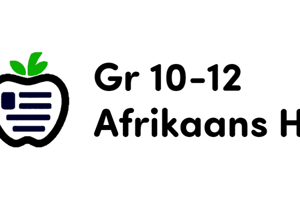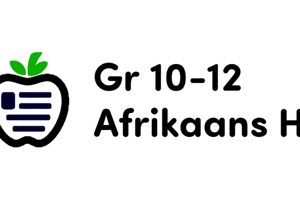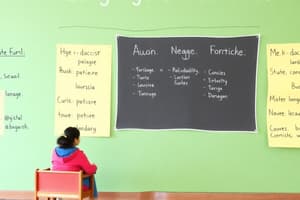Podcast
Questions and Answers
Wat is 'n voorbeeld van 'n samestellende sin?
Wat is 'n voorbeeld van 'n samestellende sin?
- Hardloop vinnig.
- Ek hardloop en skree. (correct)
- Ek hardloop vinnig.
- Wanneer ek hardloop.
Adjektiewe beskryf werkwoorde.
Adjektiewe beskryf werkwoorde.
False (B)
Noem twee tipes leestekens.
Noem twee tipes leestekens.
Komma, vraagteken
Die ______ het in die botsings gesien.
Die ______ het in die botsings gesien.
Pas die volgende woorde met hul definisies:
Pas die volgende woorde met hul definisies:
Wat is die doel van 'n narratiewe teks?
Wat is die doel van 'n narratiewe teks?
Die woorde 'mooi' en 'pragtig' is sinonieme.
Die woorde 'mooi' en 'pragtig' is sinonieme.
Wat is die byvoeglike vorm van die woord 'groot'?
Wat is die byvoeglike vorm van die woord 'groot'?
Die skrywer het 'n ______ in sy verslag ingesluit.
Die skrywer het 'n ______ in sy verslag ingesluit.
Watter van die volgende is 'n voorbeeld van 'n formele skryfwerk?
Watter van die volgende is 'n voorbeeld van 'n formele skryfwerk?
Flashcards are hidden until you start studying
Study Notes
Afrikaans Grade 7 IEB Revision Notes
Language Structure
-
Parts of Speech
- Nouns: Common and proper nouns.
- Verbs: Action words; present, past, and future tenses.
- Adjectives: Descriptive words; comparative and superlative forms.
- Adverbs: Modify verbs, adjectives, and other adverbs.
-
Sentence Construction
- Simple sentences: One independent clause.
- Compound sentences: Two independent clauses joined by conjunctions (and, but, or).
- Complex sentences: One independent clause and at least one dependent clause.
-
Punctuation
- Full stops, commas, question marks, exclamation marks.
- Quotation marks for direct speech.
- Apostrophes for contractions and possessives.
Vocabulary
-
Synonyms and Antonyms
- Understand common synonyms and antonyms to enhance vocabulary.
-
Word Formation
- Noun forms: adding prefixes/suffixes.
- Verbs and their forms: infinitives, gerunds, and participles.
Reading Comprehension
-
Text Types
- Narrative: Focus on story elements (characters, setting, plot).
- Informative: Understand main ideas, supporting details, and conclusions.
- Persuasive: Identify arguments, counterarguments, and persuasive techniques.
-
Critical Reading Skills
- Summarizing: Condense information to main points.
- Inference: Read between the lines to understand deeper meanings.
- Context clues: Use surrounding words to determine meanings of unfamiliar words.
Writing Skills
-
Creative Writing
- Structure: Introduction, body, conclusion.
- Use of dialogue and descriptive language.
-
Formal Writing
- Formal letters, reports, and essays.
- Clarity, coherence, and structured paragraphs.
-
Editing and Proofreading
- Check for grammar, spelling, and punctuation errors.
- Ensure clarity and flow in writing.
Listening and Speaking
-
Listening Skills
- Comprehend spoken Afrikaans in various contexts.
- Identify key points and details from audio materials.
-
Speaking Skills
- Engage in conversations: Use proper greetings, ask questions, and express opinions.
- Presentations: Structure, clarity, and effective use of body language.
Cultural Context
-
Literary Works
- Familiarize with key authors and their contributions to Afrikaans literature.
-
South African History and Culture
- Understanding the role of Afrikaans in the diverse cultural landscape of South Africa.
Preparation Tips
-
Practice Past Papers
- Familiarize with exam format and types of questions.
-
Group Study
- Collaborate with peers for discussion and clarification of concepts.
-
Daily Revision
- Set aside time each day to review vocabulary, grammar, and writing techniques.
Taalstruktuur
- Spraakdele
- Selfstandige naamwoorde: Algemene en eie naamwoorde.
- Werkwoorde: Aksiewoorde met teenwoordige, verlede en toekomstige tye.
- Byvoeglike naamwoorde: Beskrywende woorde; vergelykende en superlatiewe vorms.
- Bywoord: Verander werkwoorde, byvoeglike naamwoorde, en ander bywoorde.
- Sinstruktuur
- Eenvoudige sinne: Een onafhanklike klousule.
- Samestellende sinne: Twee onafhanklike klousules gekoppel deur samestellers (en, maar, of).
- Kompleks sinne: Een onafhanklike klousule met minstens een afhanklike klousule.
- Interpunksie
- Volle punte, komma's, vraagtekens, uitroeptekens.
- Aanhalingstekens vir direkte spraak.
- Apostrofs vir samentrekkings en besit.
Woordeskat
- Sinonieme en Antonieme
- Begrip van algemene sinonieme en antonieme om woordeskat uit te brei.
- Woordvorming
- Naamwoordvorme: Voeg voorvoegsels en agtervoegsels by.
- Werkwoorde en hul vorme: Infinitiewe, gerundes, en deelwoorde.
Leesvermoë
- Tekstipes
- Narratief: Fokus op storie-elemente (karakters, agtergrond, intrige).
- Informasioneel: Verstaan van hoofidees, ondersteunende besonderhede, en gevolgtrekkings.
- Overtuigend: Identifikasie van argumente, teenargumente, en oortuigende tegnieke.
- Kritiese Leesvaardighede
- Opsomming: Inligting saamgepers tot hoofpunte.
- Afleiding: Tussen die lyne lees om dieper betekenis te verstaan.
- Konteksindikasies: Gebruik omringende woorde om betekenis van onbekende woorde te bepaal.
Skryfvaardighede
- Kreatiewe Skryfwerk
- Struktuur: Inleiding, liggaam, gevolgtrekking.
- Gebruik van dialoog en beskrywende taal.
- Formele Skryfwerk
- Formele briewe, verslae, en opstelle.
- Duidelikheid, samehang, en gestruktureerde paragrawe.
- Redigering en proeflees
- Kontroleer vir grammatika, spel en interpunksiefoute.
- Verseker duidelikheid en vloei in skryfwerk.
Luister- en Sprekervaardighede
- Luistervaardighede
- Beheersing van gesproke Afrikaans in verskillende konteks.
- Identifiseer sleutelpunte en besonderhede uit audio-materiale.
- Sprekervaardighede
- Betrek in gesprekke: Gebruik van regte groetnie, vra vrae, en uitdrukking van menings.
- Aanbiedings: Struktuur, duidelikheid, en effektiewe gebruik van liggaamstaal.
Kulturele Konteks
- Letterkunde
- Verskaf kennis oor sleutelauteurs en hul bydraes tot die Afrikaanse literatuur.
- Suid-Afrikaanse Geskiedenis en Kultuur
- Verstaan van die rol van Afrikaans in die diverse kulturele landskap van Suid-Afrika.
Voorbereidingwenke
- Praktiseer Vorige Vraestelle
- Verkenken van eksamenformaat en tipes vrae.
- Groepstudie
- Samewerking met maats om konsepte te bespreek en te verhelder.
- Dagelijkse Hersiening
- Stel tyd daar vir daaglikse hersiening van woordeskat, grammatika, en skryftegnieke.
Studying That Suits You
Use AI to generate personalized quizzes and flashcards to suit your learning preferences.




